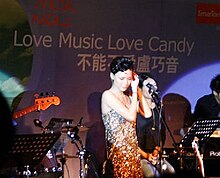Bat Seui Yiu... Yun Mei Dak Ho Pa
| Candy Lo | |
|---|---|
 |
|
| Background information | |
| Chinese name | 盧巧音 (traditional) |
| Chinese name | 卢巧音 (simplified) |
| Pinyin | Lú Qiǎo Yīn (Mandarin) |
| Jyutping | Lou4 Haau2 Jam1 (Cantonese) |
| Born |
盧巧音 18 October 1974 Hong Kong |
| Other names | Lum Lum (nickname) |
| Origin | Hong Kong |
| Occupation | Singer, actress |
| Years active | 1995–present |
| Genre(s) | Chinese rock, Cantopop, alternative rock |
| Label(s) | Sony Music [Hong Kong] (1998–2006) WOW Music (2007-2008) WhatsUp Music Ltd (2014-2015) |
| Associated acts | Black & Blue |
| Website | Official website |
Candy Lo is a Canto-rock singer-songwriter and film actress from Hong Kong. Formerly the lead vocalist of the band Black and Blue, Lo launched her solo career in 1998 and is best known for the singles, "Trash" (垃圾) and "Please Break Up" (好心分手).
Prior to going solo, Lo was the lead vocalist in the Hong Kong indie rock band Black & Blue, which released two albums: Hope in Just One Day (1995) containing songs mostly sung in English; and Black & Blue (1996) which was sung completely in Cantonese, a decision made with their record label to make themselves more understandable to fans. Lo wrote all the lyrics on both albums.
In 1998, Lo was signed onto Sony Music to launch a career as a solo artist. Her first release under Sony was the EP Don't Have to be...Too Perfect (不需要...完美得可怕) which contained the breakthrough radio-hit "Trash" (垃圾), considered one of her signature songs. Although "Trash" was a fairly mainstream ballad, the rest of the EP showed a continuity with her indie past as part of Black & Blue. Lo would later ditch Keith Chan and Wyman Wong who had a dominant presence on the EP to work with entirely different songwriters and lyricists for her debut album. Released in late 1998, Lo's first full-length solo album was titled Miao, which referred to her love of cats and how "they listen while people sometimes don't."Miao was apparently released to "more than disappointing" album sales and low radio airplay, with producer Kubert Leung remarking that the public had "failed to grasp the concept of the album."
Lo's sophomore album, Getting Closer to Candy Lo (貼近盧巧音) (1999), represented a more conscious attempt to connect with a mainstream audience, while retaining a sense of the unique individualism found in Miao. The album continued to set Lo's music apart from the mainstream. It contained five of her compositions, including the single "Regeneration," (新陳代謝) which was influenced by 70's art rock. Upon release, the album garnered her some comparisons as "Hong Kong's Faith Yang". Art direction for the album was done by William Chang.
A substantially more commercial direction was signalled by the release of 2002's Appreciating the Taste of Life (賞味人間), which gave Lo her first-ever smash hit, "Please Break Up" (好心分手). The song topped the charts and won her year-end awards at all four of Hong Kong's major radio and TV stations, making it a career highlight for Lo. A duet version of the song was recorded with Taiwan singer Leehom Wang to accompany the second edition of the album. The song remains one of the most frequently requested songs at Hong Kong karaoke bars to this day.
...
Wikipedia
